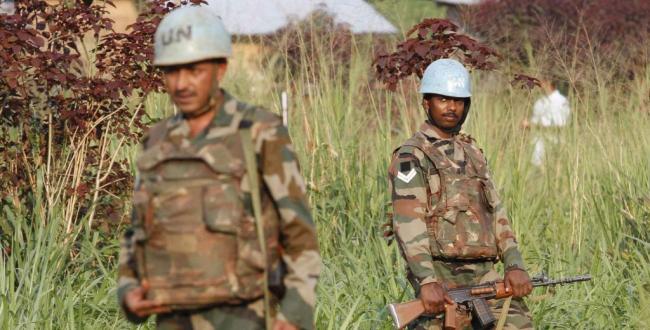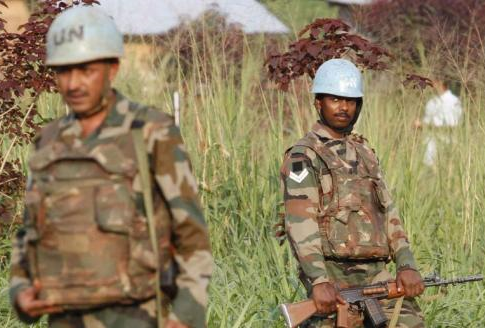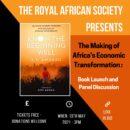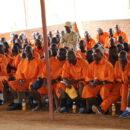DRC: Peacekeeping and politics – MONUSCO is essential but must re-deploy east – By Marco Jowell

Forthcoming elections in the Congo will be volatile and will not only set the foundations for the domestic political climate but will also dictate international engagement with the Democratic Republic of Congo for the foreseeable future. It is essential that the UN peacekeeping mission, MONUSCO, and the international community stay engaged in consolidating current gains made in “˜stabilisation’ – the transition from conflict to post-conflict reconstruction through development programmes – in the areas it is currently deployed, but it should also reconfigure for more effective peacekeeping by formulating better mission plans that prioritise, most crucially, the protection of civilians in conflict affected regions.
The Elections
Congo is scheduled to have its second consecutive elections (barring delays) during the week of the 27th November.. This is an amazing achievement in itself. The country is emerging from over thirty years of kleptocratic dictatorial rule, two regional wars leading to the near destruction of what was left of the Congolese state, and is suffering from remnants of various rebel factions still operating in the substantially ungoverned parts of the country. Neighbouring countries such as Uganda and Rwanda have also played a crucial role in its de-stabilisation for a variety of security and economic reasons.
Since emerging from open war with the signing of the Lusaka Agreement and the shaky progress of the Inter-Congolese Dialogue the DRC has managed to remove foreign armies from its territory, put in place a “˜stabilisation strategy’ and held elections in 2006. However, this hides another part of a less rosy looking picture. Politics and power structures in DRC are still dominated almost exclusively by political entrepreneurs in Kinshasa and in the provinces who rely on patronage relationships to maintain their positions. The incitement of inter-communal hostility is a key concern. Clashes have already occurred and will continue but widespread sustained “˜Arab Spring’ style revolution is highly unlikely. In part this is due to a fractured opposition and destitute population but perhaps more importantly it is also down to the lack of infrastructure to effectively organise any meaningful protest across the country.
The incumbent president, Joseph Kabila, is likely to win the presidential elections, having abolished the second run off vote earlier this year. Kabila, who has been president since 2001, has used state coffers and the security services to oil his campaign. The leading opposition candidate is veteran political opponent Etienne Tshisekedi of the UDPS. At 78 and in ill-health, Tshisekedi is a determined campaigner and has an admittedly strong following. UDPS supporters have clashed regularly with security services in the last few months and fears abound of more to follow post-election. Candidates, such as Vital Kamerhe, the MLC, Kengo wa Dondo, PALU and others may take significant portions of the vote as well.
Implications for MONUSCO
Whatever the result in the elections there will be implications for MONUSCO. If widespread violence occurs the peacekeeping force will be called upon to intervene. If Kabila wins, which is the most likely scenario, he may ask the mission to leave as he did last year. If Tshisekedi wins he may also ask for MONUSCO to leave to assert himself from day one, but is less likely to than Kabila. Kamerhe and others may also want a different looking UN presence in 2012. In short, there is a degree of post-election uncertainty related to the mission’s current deployment.
It is however essential that a sizeable UN presence remains for the foreseeable future, but significant reconfiguration of the mission to reflect the changing dynamics in Congo should now take place.
The DRC is not conflict free. The Eastern provinces of North and South Kivu, Orientale and Maniema have armed groups, both originally from neighboring states and the DRC itself, which operate with impunity. Although open conflict has dramatically reduced, Congolese populations in rural areas are constantly preyed upon, rebel groups still recruit actively and they have dominated the trade of various commodities in the region. Furthermore, the military is in a poor state, regularly abuses the Congolese population and the integration of some rebel groups into the national army has simply resulted in the swapping of uniforms and little else. Although full of its own issues and constraints it is essentially MONUSCO that has kept the lid on things in the east. If it were to leave or dramatically draw down, an escalation in violence would surely follow.
The UN can more usefully improve its “˜stabilisation’ focus and eventually transition out of DRC by reconfiguring the way it is deployed. At the moment MONUSCO has a large presence in Kinshasa including the Special Representative of the Secretary General (SRSG), the Deputy SRSG, the Force Commander, Deputy Force Commander, senior political affairs team, the senior planning team, logistics team and air service, administration team and some troops protecting UN installations. These units support efforts focused thousands of miles away in the eastern provinces, far removed from the day-to-day reality in Kinshasa. This system is highly inefficient, with key problems being a lack of up to date information, poor communications and a low-capacity for rapid reaction and operational planning.
The SRSG should remain in Kinshasa to keep the high level diplomatic channels open between Kinshasa and the UN, but almost all other positions should be re-deployed to the east. A rapid reaction force (provided for in the current mandate) should be quickly set up and located in a central position, or in a number of central positions, perhaps Kisangani and/or Kinshasa. All other MONUSCO assets should prioritise the process of stabilising the eastern provinces and work in tandem with UN humanitarian and development agencies.
International organisations, donor governments, and those states currently sitting on the UN Security Council, permanent or non-permanent, should use their limited leverage with the UN and the DRC to ensure that MONUSCO becomes more efficient in order to uphold its mandate. Any reconfiguration would have to be next year and should be reflected in the next mandate renewal. Most crucially any re-deployment must be rooted in evidence from the ground and be a gradual process.
These are landmark elections in DRC’s tumultuous history could usher in a new era of politics for the country, although the status quo is likely to continue. The process will be messy and volatile in the short term. Given the character of Congo’s political climate and fledgling state structures combined with persisting insecurity in the eastern provinces, the consolidation and improvement of international engagement is essential to prevent the DRC from slipping backwards. MONUSCO for its part must reconfigure itself in order to uphold the mandate more efficiently. The mission’s efforts should focus on the eastern provinces including re-deployments of senior positions from west to east to improve key tasks such as protection of civilians, communications, and associated stabilisation projects.
Marco Jowell is a former Senior Research Analyst at the Foreign and Commonwealth Office. He is currently a doctoral candidate at the School of Oriental and African Studies, London.







